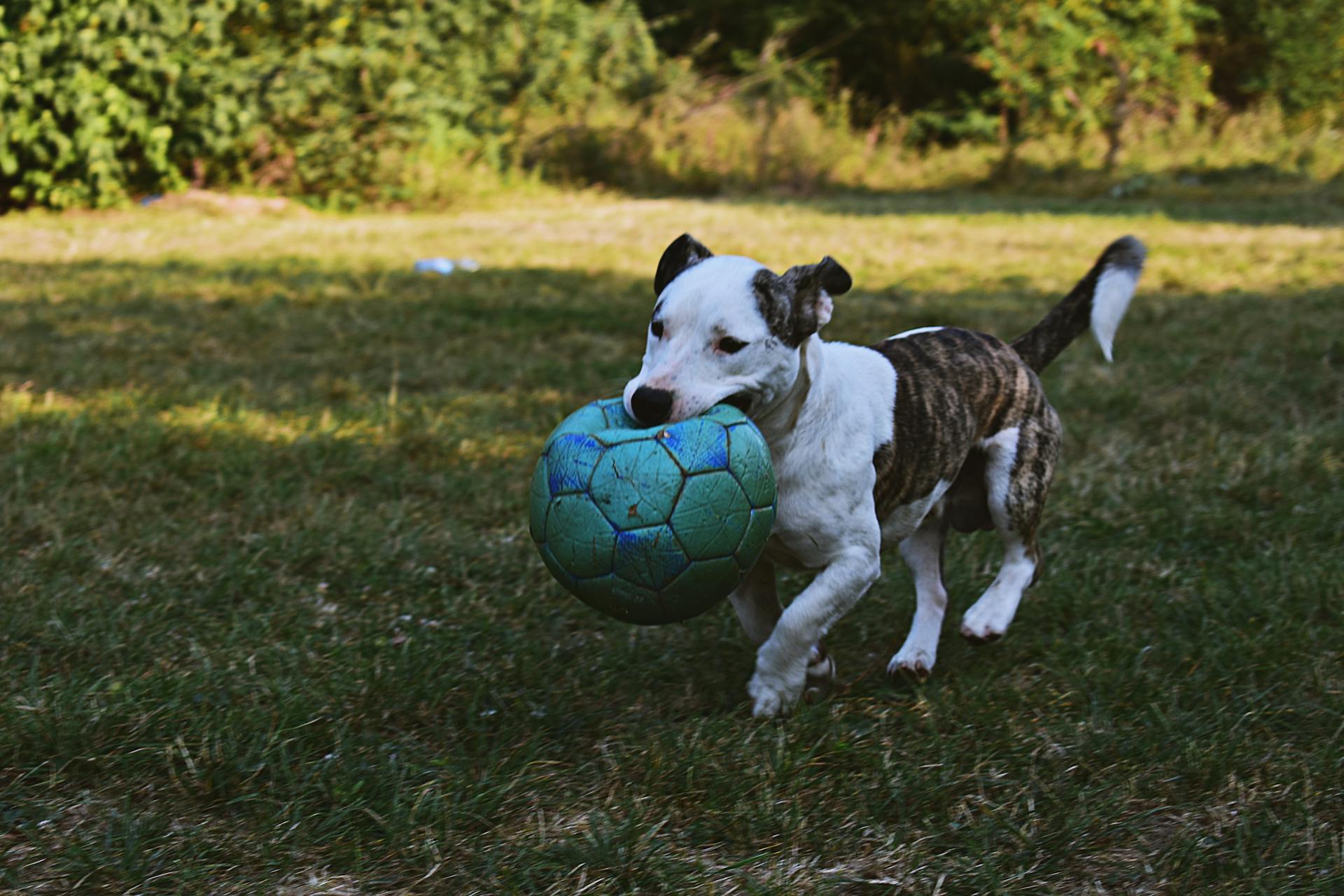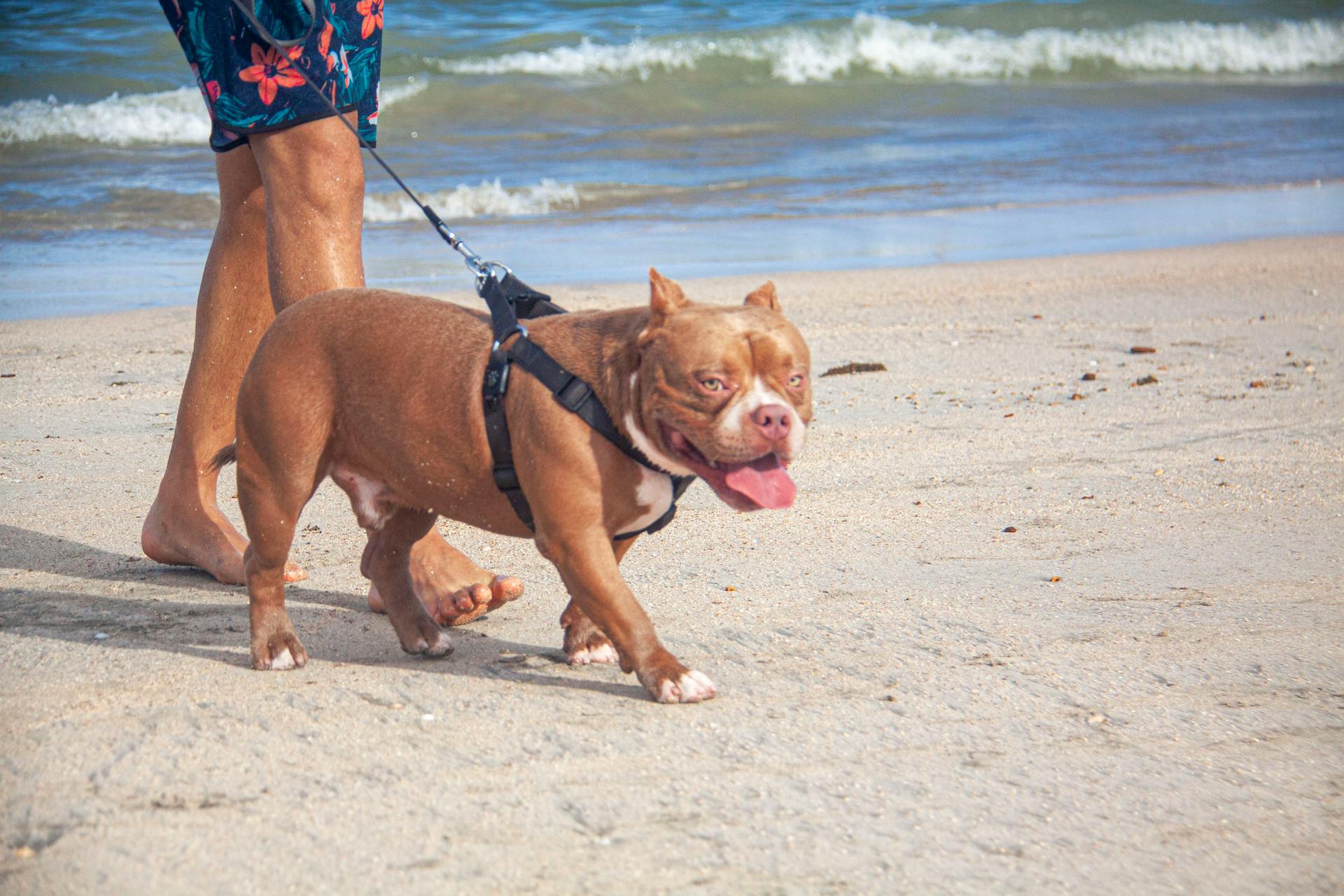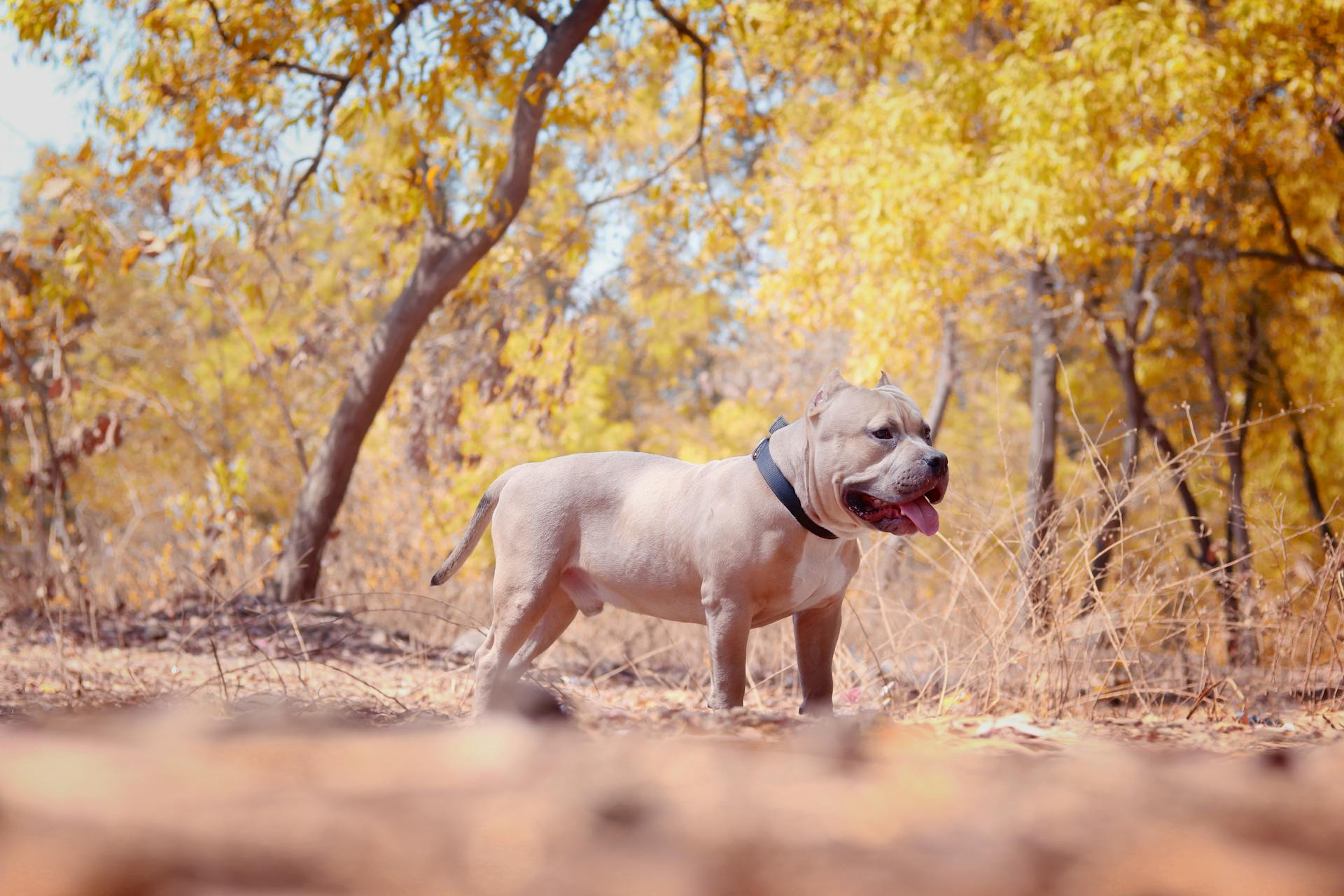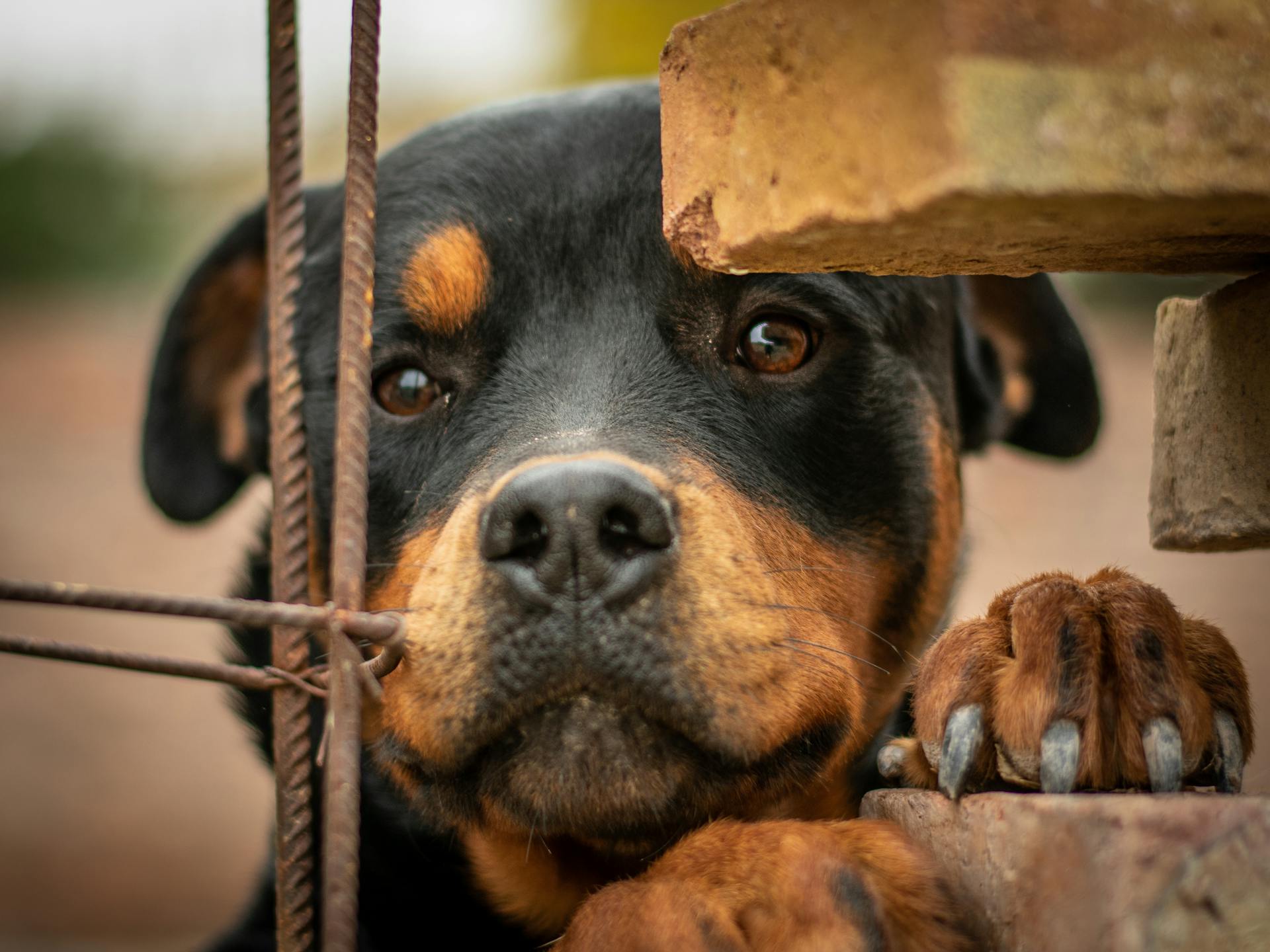
American Bully puppies require a nutrient-rich diet to support their rapid growth and development.
A high-quality puppy food that meets their nutritional needs should be fed 3-4 times a day until they are about six months old, then gradually transitioned to twice a day as an adult.
Exercise is also crucial for American Bully puppies, with daily playtime that includes running, playing fetch, and other energetic activities recommended to help burn off excess energy and stimulate their minds.
Socialization is equally important, with early exposure to various environments, people, and other animals helping to shape their temperament and confidence.
Intriguing read: National Boston Terrier Day
Health and Wellness
American Bully puppies are generally healthy animals, but they can be prone to certain health issues.
Hip dysplasia and elbow dysplasia are two common conditions that can affect American Bullies, causing pain and mobility problems as they age. These conditions occur when the joints don't develop properly, leading to arthritis and other complications.
Skin issues and brachycephalic syndrome are also potential health risks for American Bully puppies, so it's essential to work with reputable breeders who prioritize their dogs' health.
Regular veterinary check-ups can help identify any growth disorders early on. If you notice your puppy isn't growing at the proper rate, take them to the vet right away.
Some common growth disorders in American Bullies include hip dysplasia and elbow dysplasia, as well as walking difficulties, muscle wasting, bowed legs, abnormal posture, and obesity.
Here are some potential health issues that can affect American Bully puppies:
- Hip dysplasia
- Elbow dysplasia
- Skin issues
- Brachycephalic syndrome
- Growth disorders (including hip dysplasia, elbow dysplasia, walking difficulties, muscle wasting, bowed legs, abnormal posture, and obesity)
The average lifespan of an American Bully is eight to 12 years, so it's crucial to prioritize their health and wellness from a young age.
Growth Stages
American Bully puppies don't grow at an equal rate throughout their lifetime. Their growth is typically faster during puppyhood.
This is when most changes appear and your pup should gain the most weight. Once your pup reaches adult weight, the changes should be less obvious and slower.
Here's a breakdown of American Bully growth stages:
As your Bully puppy grows, you can expect them to become curious and interested in the world around them. They'll start exploring and mimicking the behaviors of their littermates.
Their growth spur will slow down by about 6 months old, but they might still have some changes throughout their life depending on their nutrition, health, and genetics.
Care and Maintenance
The American Bully's short coat requires brushing with a firm bristle brush several times a week.
Regular bathing is not necessary unless they roll in something offensive. Brushing teeth once a week and clipping nails regularly are also important tasks for their parents to carry out. Checking ears for signs of infection should be done regularly as well.
This muscly dog needs an hour of activity a day, with 16 miles of walking a week being a good target. However, this can vary depending on their size. Owners should also keep in mind that American Bullies with short muzzles can become easily breathless or overheated during exercise.
Readers also liked: Australian Silky Terrier Short Hair
Maintenance

Maintenance is a crucial aspect of caring for your American Bully.
The short coat requires brushing with a firm bristle brush several times a week to prevent matting and tangling.
Regular bathing is not necessary unless your dog rolls in something offensive. Brushing teeth once a week at least should be done regularly, along with clipping nails and checking ears for signs of infection.
Exercise plays a significant role in keeping your American Bully happy and healthy – an hour of activity a day and 16 miles of walking a week is recommended, though this can vary depending on size.
Broaden your view: 8 Week Old Boston Terrier
Puppy Care
The American Bully breed doesn't ask for much when it comes to grooming, but regular brushing with a firm bristle brush several times a week is necessary.
Essential tasks like brushing teeth once a week at least, clipping nails regularly, and checking ears for signs of infection are also crucial. As a responsible pet owner, these tasks should be carried out on a regular basis.
Suggestion: 8 Week Old Yorkshire Terrier Puppy
An hour of activity a day and 16 miles of walking a week will keep your American Bully happy and healthy. However, if you have an American Bully with a short muzzle, watch out for signs of overheating or breathlessness.
Regular bathing is not necessary unless your dog rolls in something offensive. A firm bristle brush is all the grooming tool you'll need to keep their short coat clean.
Here are some essential items to have available before bringing home your new furry friend:
- A water bowl (expensive or low-cost, it serves the same function)
- Regular brushing sessions with a firm bristle brush
- Regular nail clipping and ear checks
- An hour of activity a day and 16 miles of walking a week
Other Pets
American Bullies generally get along well with other dogs, making them a good fit for households with multiple canine companions.
Early exposure to other pets during puppyhood can help your American Bully feel more comfortable around cats and possibly other small pets.
It's essential to educate your children on how to properly handle an American Bully, as they are eager to play with kids and please them.
For the safety of smaller animals like gerbils or hamsters, it's not recommended to leave your American Bullies alone with them.
Take a look at this: Pit Bulls as Pets
Dog Rescue Groups
If you're considering adopting an American Bully, you might be wondering about dog rescue groups that can help.
Rescue organizations are available to help unwanted or neglected American Bullies find a new home. These organizations often work with volunteers and have adoption centers locally, but it might be easier to search for one online.
Before filling out paperwork and paying an adoption fee, you can provide our American Bully another opportunity for a new home.
Here are some rescue groups you may want to get in contact with:
- New York Bully Crew: A New York-based non-profit organization that works with volunteers to rescue dogs from bad environments.
- Brave Bully Rescue: Based out of Houston, Texas, this non-profit focuses on rehoming dogs and educating the communities about bully breeds.
- Fresno Bully Rescue: A California-based group that has successfully found new homes for over 2,800 dogs and promotes responsible dog ownership.
Size Variations and Bloodlines
The American Bully puppy comes in a variety of sizes, which can be confusing for new owners. There are four main size categories: Standard, Pocket, Classic, and XL (Extra Large).
All dogs are initially listed as Standard until they reach one year of age, at which point they're reclassified based on their size. This means that your puppy will start off as a Standard, but may grow into a different category.
Some breeders also recognize smaller sizes like Micro Bullies or larger sizes like Extreme Bullies and XXL Bullies, but these aren't officially recognized by the American Bully Kennel Club (ABKC). The United Kennel Club (UKC) only recognizes one size for the American Bully breed.
Here's a breakdown of the main size categories:
- Standard: typically weighs between 70 to 120 pounds and stands 16 to 22 inches tall
- Pocket: not specifically defined, but generally smaller than Standard
- Classic: not specifically defined, but likely falls in the middle range of sizes
- XL (Extra Large): larger than Standard
Keep in mind that size can vary depending on factors like feeding habits and exercise level.
Differences in Sizes
The American Bully breed comes in various sizes, and understanding these differences can be helpful when selecting a puppy or learning about this breed.
There are several size categories for American Bullies, including Standard, Pocket, Classic, XL (Extra Large), and potentially others like Extreme Bullies and XXL Bullies. However, not all kennel clubs recognize the same size variations.
The American Bully Kennel Club (ABKC) recognizes four official sizes: Standard, Pocket, Classic, and XL. These sizes are determined after a dog reaches one year of age, based on its weight and height.
Expand your knowledge: Bull Terrier Pocket
Here's a brief overview of the recognized sizes:
Some breeders, like those with the Kurupt Bloodline, are known for producing larger dogs. However, these sizes may not be recognized by all kennel clubs or considered part of the traditional American Bully breed.
It's essential to note that different kennel clubs have varying standards for size variations. For example, the United Kennel Club (UKC) only recognizes one American Bully size and considers other sizes to be faulty.
Classic
The Classic American Bully is a wonderful size variation that many owners adore. It typically weighs between 70 to 120 pounds.
As with all American Bullies, its size and weight can vary depending on factors such as feeding habits and exercise level. The height of the Classic American Bully at the wither ranges from 16 to 22 inches tall.
One thing to keep in mind is that the different sizes of American Bullies have been officially recognized by the American Bully Kennel Club (AKBC). They categorize the breeds into four main categories: Standard, Pocket, Classic, and XL.
Here's an interesting read: Classic American Bully Dog
Exercise, Training, and Socialization
Exercise is a must for American Bullies, with at least an hour of physical activity required each day to ensure they reach their healthy weight and height on time.
This can be spread throughout the day, and it's essential to remember that excessive exercise, especially during growth stages, can negatively affect bone development. Unstimulated dogs have a tendency to become destructive, so providing enough toys and mental stimulation is crucial.
As American Bullies grow older, their exercise requirements might change, but exercising should be seen as an opportunity to strengthen your bond with your pet, not a hassle. They love playing fetch, running around in fenced yards, and even engaging in play that verges on rough - just be sure they stop when you tell them to!
Temperament
The American Bully temperament is a topic that deserves some attention, especially when considering exercise, training, and socialization.
American Bullies can be powerful animals if not trained properly, which is why some governments have banned or are considering banning the breed due to high-profile incidents.
With effective training and socialization at a young age, American Bully puppies will grow up to be respectful and gentle. They might engage in play that verges on rough, but they should stop when you tell them to stop.
Parents who can't commit time and patience to this process are advised to consider another breed or an adult American Bully who's a bit more mature in psyche. This is because untrained dogs have the tendency to become destructive, which affects everybody involved.
The American Bully is prized for their intelligence, which means they'll need plenty of toys to keep their brains occupied and prevent boredom from leading to destruction.
Physical Activity
Physical activity is essential for American Bullies to grow tall and stay fit.
All creatures need physical activity to thrive, including our furry friends. Providing enough exercise ensures they reach their healthy weight and height on time and prevents many health problems.

American Bullies require at least an hour of exercise a day, which can be spread throughout the day. Their exercise needs depend on their age and health.
Exercise is highly beneficial for American Bullies as it helps expand their energy and keep their mind stimulated. Without enough physical activity, they may develop unwanted destructive behavior.
As your dog gets older, their exercise requirements might change. Exercising should not be seen as a hassle but as an opportunity to strengthen your bond with your pet.
The right amount of exercise is crucial - too much can negatively affect their growth rate and bone development.
Training
Training is a top priority when it comes to your American Bully. They are intelligent dogs that thrive on mental stimulation and exercise.
The American Bully breed has a pack mentality, which means they require a calm and self-assured owner who can establish themselves as the alpha in the pack. This helps them follow commands more willingly.
If you don't train your American Bully properly, it might result in negative behaviors such as chewing problems, using the bathroom in unwanted areas, not playing nice with other dogs, failing to obey commands, and excessive barking.
Some essential commands that every dog should learn include sit, down, stay, wait, heel, come, off, rolling over. These basic commands will help you establish a strong bond with your American Bully and ensure they behave well in public.
To prevent unwanted behaviors, it's crucial to train your American Bully as soon as possible, especially during puppyhood when they're most receptive to learning new things.
Here are some basic training requirements for an American Bully:
- Sit
- Down
- Stay
- Wait
- Heel
- Come
- Off
- Rolling Over
Socialization is also a vital part of training your American Bully. This kind of training allows them to get along easier with other dogs and house guests, making them a great breed for families.
By following these simple steps and consistently practicing good behavior, you'll be well on your way to raising a happy, healthy, and well-behaved American Bully.
Nutrition and Feeding
A balanced diet is key to your American Bully puppy's development. A dog that doesn't get all the necessary nutrients will grow much slower than his littermates that have eaten properly from puppyhood.
You should give your American Bully a healthy diet full of essential nutrients, including proteins, carbs, and fats. This will help them grow fit and strong.
Feeding your American Bully is pretty easy! All you need is a feeding bowl and dog food. Make sure it's dry dog food made with organic and all-natural ingredients without any harmful byproducts.
On average, you should aim to feed your pet four cups of dog food a day, split into two servings. Always have fresh water for your dog's bowl, especially during hot weather.
Dogs can tolerate and gain nutritional value from human foods. With the assistance of a vet, you can dedicate a day out of the week to feed your dog a delicious home-cooked meal.
For another approach, see: American Bully Food Allergies
Here are some tolerable foods for your American Bully:
- Certain Fruits: blackberries, apple slices (freeze them in summer), but avoid fruit seeds or pits and canned fruit.
- Limited Vegetables: kale, broccoli, carrots (steam or blanch before feeding).
- Cooked Proteins: turkey, beef, chicken, salmon (lightly salted and without seasonings).
It's recommended to keep a chart with foods dogs can and should not consume. Your American Bully may experience unwanted side effects associated with foods they cannot digest as effectively as people.
The amount you should put in their bowl will depend on their weight. It’s essential not to overfeed an American Bully, as this will put them at risk of obesity and a range of secondary conditions, such as Diabetes Mellitus.
Frequently Asked Questions
Is American Bully just a pitbull?
American Bullies are a distinct breed developed from various breeds, including Pitbulls, but they are not simply another name for Pitbulls. While related, American Bullies have their own unique characteristics and history.
Is American Bully aggressive?
American Bully temperament: While not inherently aggressive, they can be powerful and may require extra exercise and mental stimulation to prevent unwanted behaviors
Is American Bully a good dog?
Yes, with proper training and care, an American Bully can be a great family dog. They require attention to thrive as companions.
What is an American Bully a mix of?
An American Bully is a cross between an American Staffordshire Terrier, American Pit Bull Terrier, American Bulldog, Olde English Bulldog, and Bulldog
How much are American Bully dogs?
American Bully dogs typically cost between $1000 and $5000 from a reputable breeder. Prices may vary depending on bloodlines and other factors.
Featured Images: pexels.com


